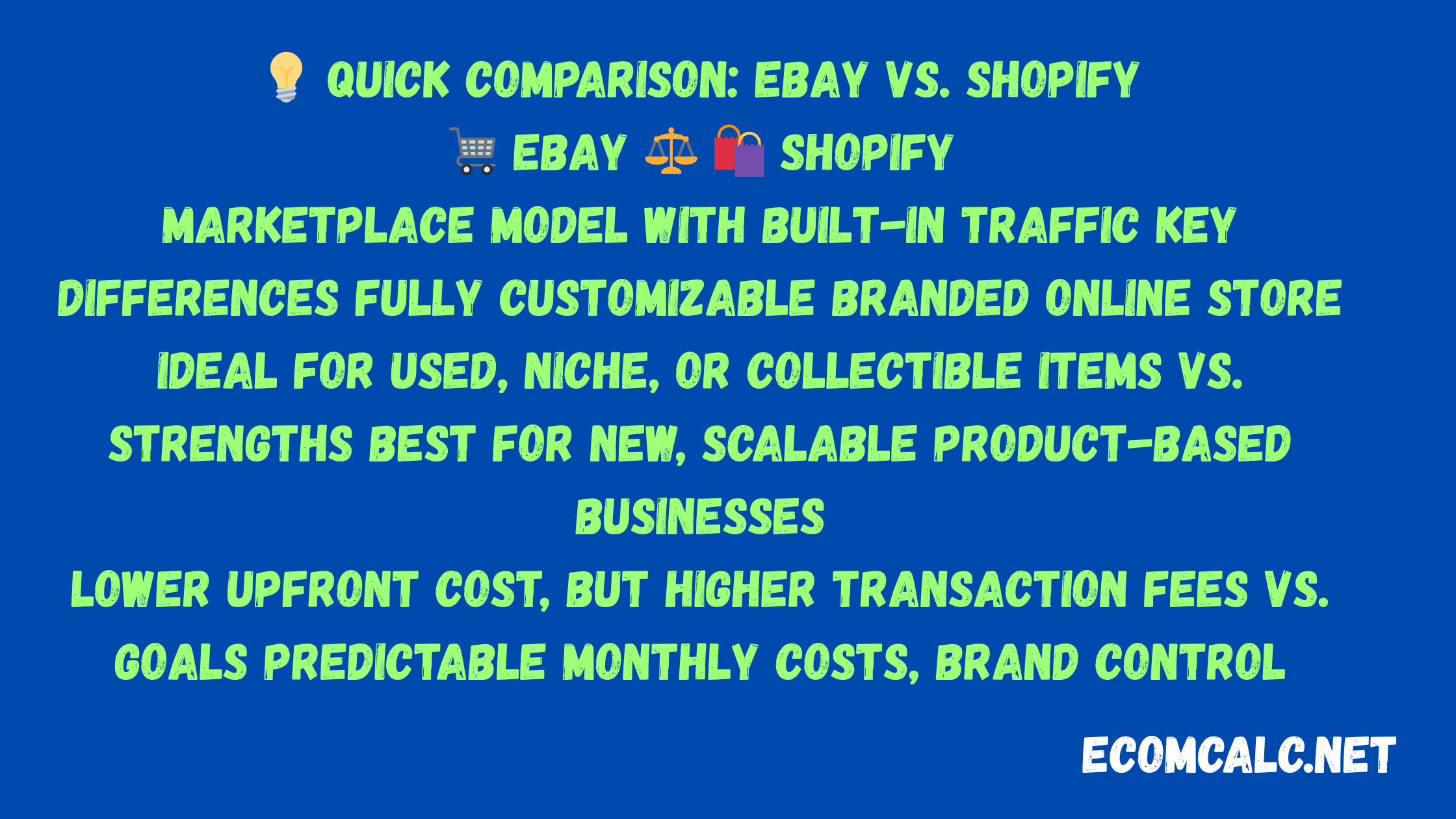eBay vs. Shopify: Which Platform is Right for You?
Published on June 10, 2023 | 10 min read
In the ever-evolving world of ecommerce, selecting the right platform can be a game-changer for your online business. Whether you’re an aspiring entrepreneur launching your first store or a seasoned seller exploring new opportunities, the decision between eBay and Shopify is pivotal. Both platforms offer unique strengths and cater to different seller needs — and understanding these differences can help you scale smartly, save on costs, and serve your customers better.
This comprehensive guide dives deep into eBay vs. Shopify to help you make the right choice based on your business model, goals, and resources.

1. Understanding the Core Business Models
eBay: A Marketplace-Driven Ecosystem
eBay functions as an online marketplace, meaning your products are listed alongside thousands of competitors. Shoppers come to eBay looking for deals, secondhand items, or niche products. You’re essentially renting a booth in a giant digital mall.
- Ideal for: Individual sellers, secondhand goods, collectibles, vintage items.
- Ease of entry: High — sign up, list, and start selling.
- Customer base: Built-in, with millions of global buyers.
Shopify: Your Own Ecommerce Store
Shopify is a website-building platform designed specifically for ecommerce. You create your own branded store, customize it fully, and have complete control over how you present and sell your products.
- Ideal for: Business owners looking to build a brand and scale.
- Ease of entry: Medium — requires design, branding, and marketing.
- Customer base: Self-generated — you must attract and retain your audience.
2. Fee Structures: What Will It Cost You?
eBay Fees
- Listing Fees: First 250 listings are free/month, then $0.35 per listing.
- Final Value Fees: Usually 10-12.9% of sale amount.
- Additional Fees: Promotions, payment processing, international sales.
Pros: Pay-as-you-sell model. No upfront monthly fees if you stay within limits.
Cons: Fees can add up quickly, especially with low-margin products.
Shopify Fees
- Monthly Plans: Basic - $29, Shopify - $79, Advanced - $299.
- Transaction Fees: 2.9% + 30¢ online (Shopify Payments).
- Additional fees for external gateways.
Pros: Predictable costs, better margins with scale.
Cons: Pay monthly, even if no sales.
💡 Pro Tip: Use a fee comparison calculator to determine ROI based on sales volume and product price.
3. Customization & Branding Capabilities
In today’s digital landscape, strong branding and customization matter more than ever.
eBay: Limited Branding Options
eBay listings follow a standard format. While you can add logos or seller info, the overall look is consistent across listings.
Shopify: Fully Customizable Storefronts
Shopify provides full control over layout, design, and features. You can build an immersive brand experience using themes and apps.
🛠️ Shopify is ideal for those wanting a unique and cohesive customer journey from homepage to checkout.

4. Customer Acquisition: Traffic Sources and Marketing
eBay: Built-in Traffic
eBay gives sellers immediate access to millions of global buyers. But you're competing directly with others on the same platform.
Shopify: DIY Marketing
With Shopify, it's up to you to bring traffic through SEO, ads, social media, and email campaigns.
🎯 Shopify offers greater long-term potential for customer retention and brand growth.
5. Best Use Cases: Which Platform Suits What Kind of Seller?
Choose eBay If You…
- Sell used, rare, or limited-quantity products.
- Want built-in traffic and minimal setup.
- Operate as a side hustle or in a niche category.
Choose Shopify If You…
- Want full control over branding and customer experience.
- Sell new or private-label products.
- Plan to scale and automate operations.
6. Scalability: How Big Can You Grow?
eBay: Suitable for part-time selling, but less flexible for automation and high-volume operations.
Shopify: Built to grow with your business — from startup to enterprise level.
7. Fulfillment & Shipping
eBay: Manual fulfillment unless you outsource.
Shopify: Integrates with third-party logistics, dropshipping, and print-on-demand services.
8. Payment Gateways and Security
eBay: Managed payments support multiple buyer options.
Shopify: Offers a wide range of gateways, including Shopify Payments and robust fraud prevention tools.

9. Support, Community, and Learning
eBay: Forums, FAQs, and email support.
Shopify: 24/7 live support, vast knowledge base, Shopify Academy.
10. Final Verdict: eBay vs. Shopify
eBay is for you if:
- You want easy access to ready-to-buy traffic.
- You sell unique, used, or one-time products.
Shopify is for you if:
- You aim to build and scale a long-term brand.
- You want control over customer experience and marketing.
Bonus: Use Both for Maximum Advantage
Many sellers combine both platforms — using eBay for quick turnover and Shopify for long-term brand building. This hybrid model helps maximize reach and revenue.
Conclusion
Ultimately, choosing between eBay and Shopify depends on your goals. If you’re just starting out or selling secondhand goods, eBay may be the perfect launchpad. If you’re focused on building a brand and want long-term growth, Shopify offers the tools you need to succeed.
👉 Tip: Try both! Start with eBay, then explore a free Shopify trial to experience each firsthand.